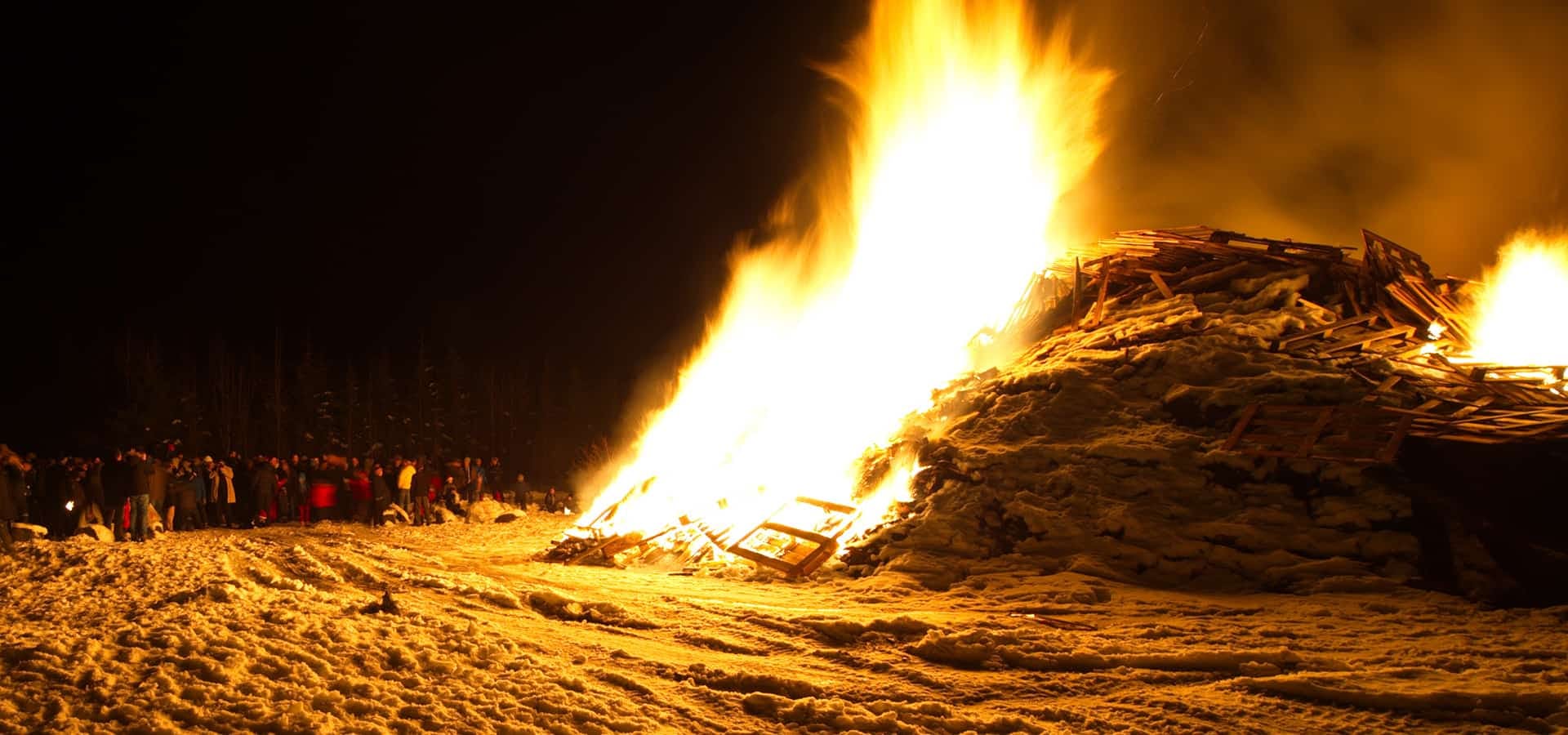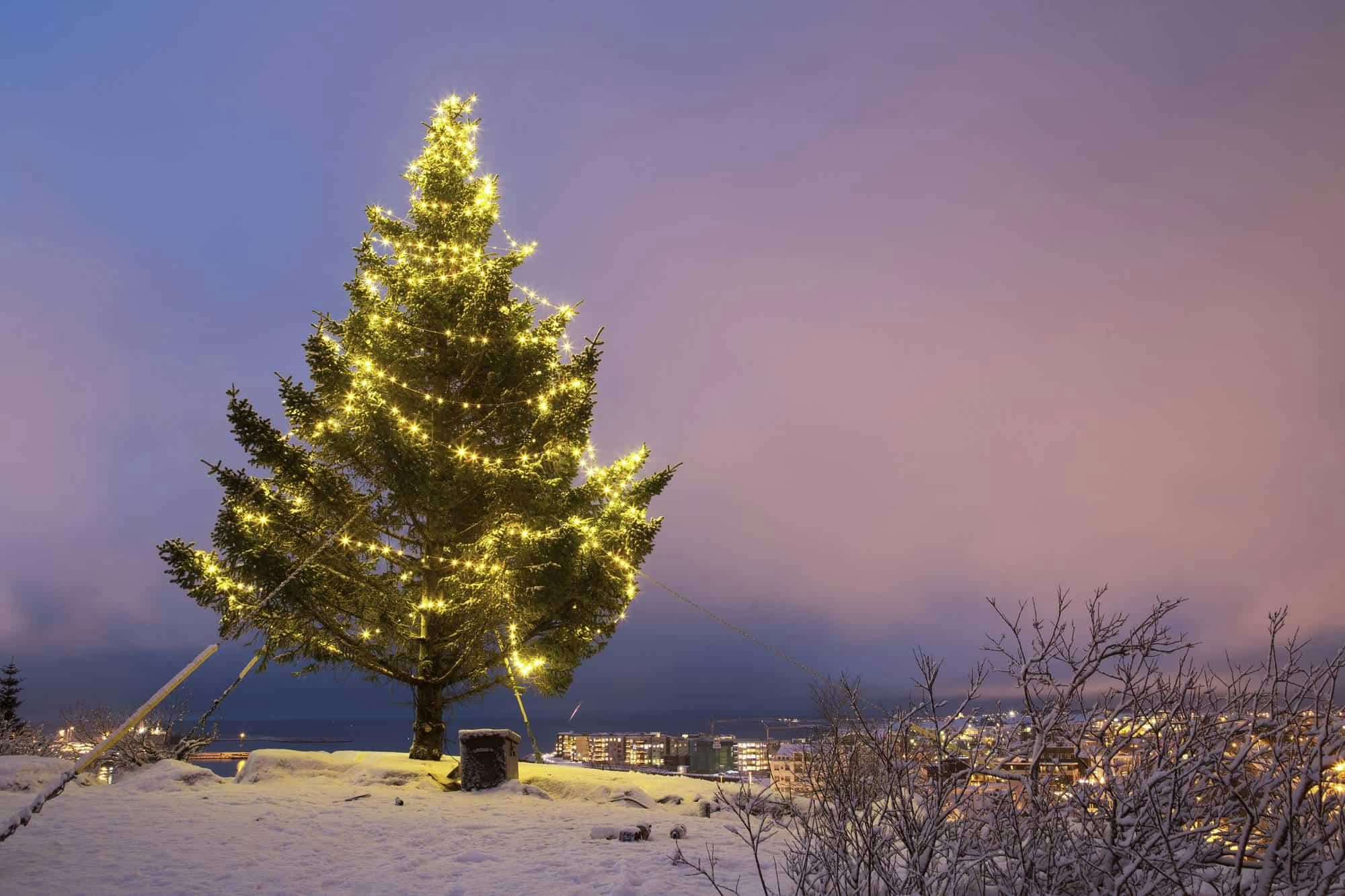Festivals & Events
There are many different annual events in Iceland which attract travellers from all over the world each year. Here is a short summary:
Thorrablot / Þorrablót (Mid-January to mid-February)
This ancient Viking midwinter tradition was originally a feast of sacrifice to the Norse God Þór and is celebrated today with plenty of dancing, singing, and feasting on traditional Viking foods like boiled sheep’s head and fermented shark washed down with Brennivín, the local caraway-seed flavoured spirit fondly known as “black death.” Modern day Icelanders don’t normally eat these foods, but during (mid-January to mid-February the traditional foods fill grocery store shelves and restaurants offer special Þorrablót menus. Festivities vary from informal dinners with family and friends to large organised events with entertainment and activities.
Winter Lights Festival (Mid to late February)
Reykjavík is cheerfully lit up for this celebration of cultural events dedicated to the theme of energy and light. Centred around Laugardalur Park, events include anything from ice skating exhibitions to outdoor choral performances.
Reykjavík Food & Fun Festival (Late Feb to early Mar)
Promotions at restaurants throughout Reykjavík bring to light the achievements of chefs and manufacturers of Icelandic gourmet products such as caviar, shrimp, lamb, and cheese. Internationally renowned chefs visit the capital and are paired with a restaurant to create a special menu for the week at discounted prices.
Reykjavík Fashion Festival & Design March (Mid March)
Started in 2010, the Reykjavik Fashion Festival provides an arena for new Icelandic designers to showcase their clothing lines and fully express their visions in a cutting-edge event program where avant-garde fashion, music and fun fuse together seamlessly for all to enjoy. Design March presents exhibitions, workshops, and events across the city from the world of design ranging from architecture to fashion, fonts, furniture and food.
Bun Day / Bolludagur (February-March)
Two days before Lent Iceland celebrates Bun Day or Bolludagur when homes, restaurants and bakeries overflow with delicately made buns in different shapes and sizes, filled with cream, jam, and drizzled with chocolate or caramel. Children wake their parents early with a colourfully decorated Bolluvöndur wand and receive a cream bun for each whack of the wand they can land.
Shrove Tuesday / Sprengidagur (February-March)
The day before Lent is known as Sprengidagur or ‘Bursting Day’ when every Icelandic home and most restaurants flood with the aroma of saltkjöt & baunir (salted lamb meat and peas), a traditional stew-like meal. The name ‘Sprengidagur’ refers to the idea that individuals feast on this hearty dish to the point of bursting.
Ash Wednesday / Oskudagur (February-March)
Ash Wednesday is celebrated in Iceland with a unique custom for children. Ashes are collected into small bags known as ‘Öskupokar.’ As a prank, these bags are secretly pinned onto people’s clothing. The day is also marked with children singing and parading around the streets and shops, begging for treats.
Easter (Late March – April)
On Easter Sunday, the traditional meal of roasted Icelandic lamb is served with rhubarb jelly and sugar-browned potatoes. Children and grown-ups alike enjoy hollowed out chocolate Easter eggs filled with candy treats and a Malshátt which is a tiny piece if Icelandic wisdom originating from some 400 proverbs based on folklore, history and homilies. Holy (Maundy Thursday, Good Friday, and Easter Monday are also official holidays in Iceland commonly celebrated by families getting together for outdoor fun and relaxation.
First Day of Summer (3rd Thursday in April)
According to ancient Icelandic calendars, there were only two seasons: summer and winter. Summer would start in late. Modern day Icelanders celebrate this national holiday with colourful parades, street entertainment, and sporting events.
Iceland Innovation Festival (Mid May)
Icelanders have gained an international reputation for their creativity and entrepreneurial spirit. Iceland Innovation Week celebrates the country’s innovation and startup scene in a quirky, fun, and funky way. This international festival takes place in Reykjavík. Actvities range from panel discussions and company visits to happy hours and even an icy ocean dip. The event attracts innovative people from Iceland and abroad, including founders, investors, companies, and public institutions.
Reykjavík Arts Festival (Late May)
This two week cultural festival showcases a wide array of concerts, operas, dance and theatre performances at local venues including the National Gallery, Harpa and the Nordic House, with spin off events happening throughout the country.
Festival of the Sea / Sjómannadagur (1st weekend in June)
This holiday runs the first weekend of June and pays tribute to those who make their living by the sea with colorful parades, cultural celebrations, seafood fairs, fisherman rescue demonstrations, rowing races, and strongman competitions.
Viking Festival (Mid June)
Modern day Vikings from across the globe descend upon the charming town of Hafnarfjörður just outside Reykjavík for a weekend of lively festivities in period costume, traditional crafts, and staged battles.
Icelandic Independence Day (June 17)
Iceland declared independence from Danish rule in 1944. It is celebrated on June 17th because it was the birthday of Jón Sigurðsson who is regarded as Iceland’s champion to the nationalist cause. After morning ceremonies in downtown Reykjavik, afternoon crowds gather around the country for vibrant parades, traditional dancing, street performers, and theatrical entertainment.
Summer Solstice (Jun 21)
Celebrations around Reykjavík honour the magic of the Midnight Sun on the longest day of the year when many Icelanders gather late at night to watch the sun dip below the horizon and rise back up again shortly afterwards.
Arctic Open International Golf Tournament (Late June)
Held just south of the Arctic Circle in the picturesque town of Akureyri, the Arctic Open is a four-day championship golfing tournament open to professionals and amateurs alike. Tee off starts at midnight in bright sunshine, with the competition taking place through the night in a distinctive natural setting.
Labour Day Weekend / Verslunnarmannahelgi (1st weekend in August)
The first weekend in August is a three-day holiday, with many businesses closed on the Monday. Most Icelanders head out of the city to camp in the wilds, or they join in one of the organised events that are held throughout this country. The most popular location is the Westman Islands, where thousands of visitors gather at the campground to hear live bands and party around the bonfires into the wee morning hours. People who want to stay in Reykjavík can enjoy concerts in various venues during the Innipúkinn Festival.
Gay Pride Parade (2nd weekend in August)
This family friendly weekend shows the nation’s support for the LGBT+ community in Iceland. There are several fun activities throughout Reykjavik, which is decorated with rainbows, as thousands of people gather to watch the highly anticipated Reykjavík Pride Parade.
Reykjavík Culture Night / Menningarnott (3rd weekend in August)
On this enchanted evening, downtown Reykjavík is closed to traffic, and the city centre transforms into a cultural mecca of free exhibitions, concerts, poetry readings, and street theater with every venue in the city utilised. Choice selections of food and drink are served, and the evening is concluded with a fireworks display over Tjörnin Pond.
Reykjavik Marathon (3rd weekend in August)
The Reykjavik Marathon is an annual event held every August on Culture Day. This international event hosts over 3.500 participants for a full or half marathon, or three, five or ten kilometer races as well as an informal family race.
Reykjavik Jazz Festival (Late August)
The Reykjavík Jazz Festival boasts a stellar line-up of jazz and blues artists from around the world playing a variety of styles at local clubs and venues during the last two weeks of August.
Reykjavík International Film Festival / RIFF (Late September-early October)
This 10-day event features a selection of the year’s best in world cinema and includes film classics, premiers, retrospectives, seminars and workshops.
Sheep and Horse Round-Up (September & October)
September brings the Réttir, an entertaining and interesting tradition where farmers around the country set off on horseback to gather their sheep and horses that have spent the summer grazing in the highlands. Once the flocks are penned and sorted by their earmarks, the farming communities host spirited celebrations with singing, dancing, and drinking into the night. Visitors are welcome to participate, and it is an ideal time to explore Iceland’s backcountry during the colourful fall season.
Imagine Peace Tower (October 9 – December 8)
In 2007 Yoko Ono unveiled the Imagine Peace Tower, a beam of light emanating from a wishing well monument on the coast of Víðey Island just outside of Reykjavík. Created in memory of her husband, John Lennon, it bears the words “Imagine Peace” in 24 languages. The tower is lit each year from Oct 9 – Dec 8.
Iceland Airwaves Music Festival (Early November)
This highly anticipated five-day alternative/indie musical showcase attracts thousands of music lovers from around the world to check out Icelandic and international talent at various venues across the vibrant capital of Reykjavik during northern lights season.
Christmas Season (December)
When the days are short, beloved Icelandic Christmas folklore adds to the mystique of the holidays with tales of thirteen Yuletide lads, their troll mother Grýla, and a fearsome Christmas Cat. City streets around the country twinkle in festive lighting, towns set up their outdoor Christmas markets, and restaurants put forward scrumptious smorgasbords. Family celebrations begin on December 24th when many people attend church services before going to a festive dinner, exchanging gifts, and dancing around the Christmas tree.
New Year’s Eve (December 31)
New Year’s Eve in Iceland is a spectacular celebration that has to be seen to be believed. Nowhere in the world are more fireworks used on this holiday, when private use of fireworks is legal for this one night only and the entire country sets the skies ablaze in celebration. At oceanside bonfires, citizens and visitors alike gather to celebrate with style!

